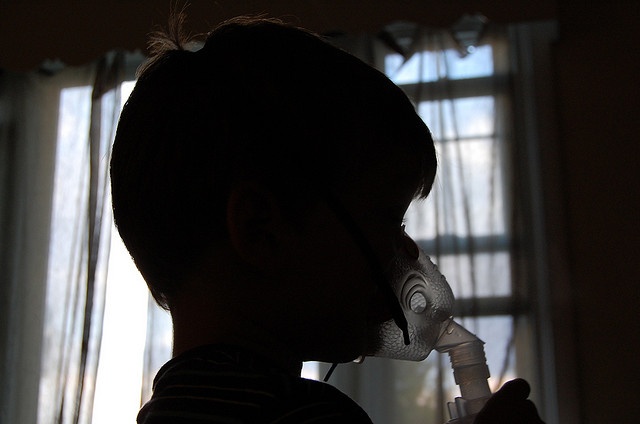Pressure builds on NC governor to veto far-reaching anti-environmental bill

Children with asthma are among those whose lives could be made more difficult by an omnibus anti-environmental bill recently passed by the N.C General Assembly. Environmental advocates are urging Gov. Pat McCrory to veto it. (Photo by KristyFaith via Flickr.)
Environmental advocates in North Carolina are stepping up pressure on Gov. Pat McCrory (R) to veto a bill they say is the most anti-environmental of the 2015 legislative session — and possibly of McCrory's tenure.
Dubbed the "Polluter Protection Act" by opponents, House Bill 765 started out as a one-page technical corrections bill tweaking regulations on highway transport of sand, gravel and rock. But after passing the House, the Regulatory Reform Act of 2015 was transformed in the Senate into a sweeping 61-page wish list for polluting industry — with some of the provisions being added in closed-door conference sessions. Lawmakers passed it in the chaotic last days of the session.
During an Oct. 20 press conference about the legislation held by environmental groups, Dr. Jonathan Kotch*, a maternal and child health specialist with UNC Gillings School of Global Public Health, called it a "paradigm example of special-interest legislation."
Among other things, the bill would:
* Offer immunity and confidentiality for companies that self-report pollution, making it harder for communities to identify potential environmental health threats;
* Repeal idling restrictions for heavy-duty vehicles, allowing them to emit more health-damaging air pollution;
* Reduce water-quality regulations on intermittent and small headwater streams, which account for more than 50,000 stream-miles in the state;
* Allow incomplete cleanup of soil and groundwater contamination; and
* Reduce the number of air-quality monitors across the state, which people with asthma and other health conditions rely on to help protect themselves from excessive pollution.
"These provisions were inserted by the Senate into a one-page House bill through a process that minimized opportunities for public involvement," stated a letter sent to McCrory last month by an alliance of 15 environmental advocacy groups. "The provisions drew bipartisan opposition in the legislature; yet, they have arrived at your desk, and now can be stopped only by your veto stamp."
The measure was shepherded through the Senate by Sen. Trudy Wade, a Greensboro Republican and veterinarian who was first elected in 2012. The N.C. League of Conservation voters has given her a lifetime environmental score of 0. Among the top contributors to her campaign are the real estate industry, special trade contractors and the trucking industry, according to the National Institute on Money in State Politics.
Early in the bill's life, the N.C. Department of Environment and Natural Resources, since renamed the Department of Environmental Quality, raised concerns about some of the provisions. But Mary Maclean Asbill of the Southern Environmental Law Center noted that by the next day the agency said its concerns had been assuaged and no longer opposed it. DEQ has seen its budget cut about 40 percent by the legislature in recent years.
"This is a sweeping environmental deregulation bill and we haven't heard from the department charged with protecting our environmental health," said Matthew Starr, the Upper Neuse Riverkeeper. "Where are they on this?"
McCrory has until the end of next week to decide whether to veto the bill, sign it or to do nothing and let it take effect without his approval. To date, concerned residents of North Carolina have sent at least 5,000 emails to the governor urging a veto, the N.C. Conservation Network reports.
To read Clean Water for North Carolina's fact sheet on the bill, click here. To sign a petition asking McCrory to veto it, click here or here.
* Disclosure: Kotch is the father of Institute for Southern Studies research associate and Facing South contributor Alex Kotch.
Tags
Sue Sturgis
Sue is the former editorial director of Facing South and the Institute for Southern Studies.
